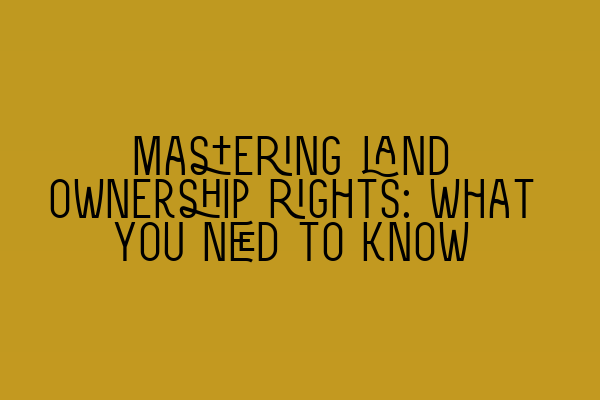Mastering Land Ownership Rights: What You Need to Know
As a property owner or someone interested in investing in real estate, understanding land ownership rights is vital. Whether you’re a first-time buyer or a seasoned investor, knowing the ins and outs of land ownership can help you navigate the complexities of property law and make informed decisions. In this article, we will delve into the key aspects of land ownership rights and provide valuable insights to help you master this important subject.
1. Types of Land Ownership
Land can be owned in various forms, and it’s crucial to understand the different types to determine your rights and obligations. The three main types of land ownership are:
- Freehold: This is the highest form of ownership, where you have absolute rights over the land and the structures on it.
- Leasehold: In leasehold ownership, you have the right to possess and use the land for a specific period, but the ultimate ownership remains with the freeholder.
- Condominium: Commonly used in multi-unit buildings, condominium ownership grants you individual ownership of a unit while sharing ownership of common areas with other unit owners.
Understanding these different forms of ownership will help you determine the extent of your rights, responsibilities, and potential limitations.
2. Boundaries and Easements
Defining property boundaries is essential for establishing ownership rights. Boundary disputes can be a common source of conflicts between neighbors, and resolving such issues requires a clear understanding of property boundaries and easements.
Easements are rights granted to others to use a portion of your land for a specific purpose, such as accessing a public road or utility lines. It’s crucial to determine any existing easements or encroachments on your property to avoid future disputes. Consulting with a qualified property law solicitor can help you identify and address any boundary or easement concerns.
3. Covenants and Restrictions
Covenants and restrictions are legal agreements that dictate how a property can be used or developed. These can be found in various forms, such as homeowner association (HOA) rules, local zoning regulations, or historical preservation restrictions.
Before purchasing a property, it’s crucial to review these covenants and restrictions to ensure they align with your intended use or development plans. Failure to comply with these agreements can result in legal consequences and challenges in selling or renting out the property.
4. Registration and Title Deeds
The registration of land is an important step in establishing ownership rights. In most jurisdictions, land ownership is recorded in a governmental registry, and a title deed acts as proof of ownership.
When acquiring a property, it’s vital to conduct a thorough search of the title deeds to check for any liens, encumbrances, or third-party claims. This will provide assurance that the seller has the legal right to transfer ownership, ensuring a smooth and secure transaction.
5. Adverse Possession
Adverse possession is a legal concept that allows someone to gain ownership of another person’s land by occupying it openly, continuously, and without permission for a specified period. This doctrine aims to prevent neglected or abandoned properties from becoming unproductive and encourages responsible land ownership.
Understanding adverse possession laws in your jurisdiction is essential to protect your property rights and prevent any adverse claims by others.
Conclusion
Mastering land ownership rights is essential for any property owner or investor. By understanding the different types of ownership, boundaries and easements, covenants and restrictions, registration and title deeds, and adverse possession, you can navigate the complex field of property law with confidence.
At SQE Property Law & Land Law, we offer comprehensive legal services to assist you with all your land ownership needs. With our expert team of solicitors, we can guide you through the intricacies of property law and ensure that your rights are protected.
For more information, please check our related articles:
